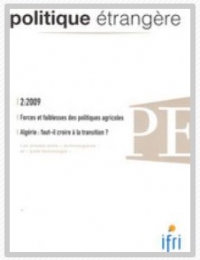Sub-Saharan Africa
Sub-Saharan Africa is not monolithic. While crises in the Sahel have attracted a great deal of attention, other regions also need to be monitored, and not just through the prism of security.
Related Subjects

Claiming "The People": Youth Booms, Ailing Authoritarians and "Populist" Politics in Kenya, Uganda, and Tanzania

This study analyses the emergence of so-called “populist” political tendencies in three East African countries: Kenya, Uganda and Tanzania. It builds its analysis on a wider discussion of the term “populism”, its use and applicability in (eastern) African settings before going on to examine the drivers of three cases of populism: William Ruto’s 2022 election victory in Kenya and the “Hustler Nation”; Bobi Wine’s opposition to Yoweri Museveni in Uganda; and John Magufuli highly personal style of government in Tanzania.


"Hunger Riots": a (Geo-Political) Interpretation of (Social) Changes
'The 2008 'riots' are not related to increased food shortages. Aside from a few interruptions in supply linked to the present economic climate, basic foods were on the whole present on urban markets.'

Candide in Congo. The Expected Failure of Security Sector Reform (SSR)
What are the prospects after the nomination of Zimbabwe's national unity government?
Summary: Following repeated bouts of political violence, which were exacerbated by the presidential and legislative elections of 29 March 2008, opposition members and the government of Zimbabwe undertook lengthy and difficult negotiations to put an end to the unrest. These negotiations resulted in the creation of a new national unity government, which was sworn in on 13 February 2009. This marks the end of a long political battle between the regime of President Robert Mugabe and his opponents, of whom the new Prime Minister Morgan Tsvangirai had been the main spokesman. In a country on the brink of economic collapse, the new government faces enormous challenges. The economic and social balance remains precarious, and the political climate is still fraught with many rivalries. Thierry Vircoulon, associate researcher of IFRI's Africa Program comments on the crisis in Zimbabwe today, and delivers some thoughts on what we may expect from the new national unity government.
Madagascar Crisis
Summary: The scale of the violence which has hit Madagascar has taken many commentators by surprise. However, early warning signs were visible over the last few months. The origin of this crisis can be linked to President Ravalomanana's management of political, economic and social issues coming into disrepute. There are numerous similarities with the 2002 political crisis even if strong nuances are also present. Mathieu Pellerin, journalist and consultant, details the political, social and economic divisions which have ripped Madagascan society apart and personal rivalries between Madagascar's president and Antananarivo's mayor. Text in English will be available very soon.
How to reform peacemaking in the Democratic Republic of Congo: When peace processes become international "systems of organized action"

Support independent French research
Ifri, a foundation recognized as being of public utility, relies largely on private donors – companies and individuals – to guarantee its sustainability and intellectual independence. Through their funding, donors help maintain the Institute's position among the world's leading think tanks. By benefiting from an internationally recognized network and expertise, donors refine their understanding of geopolitical risk and its consequences on global politics and the economy. In 2025, Ifri supports more than 80 French and foreign companies and organizations.








